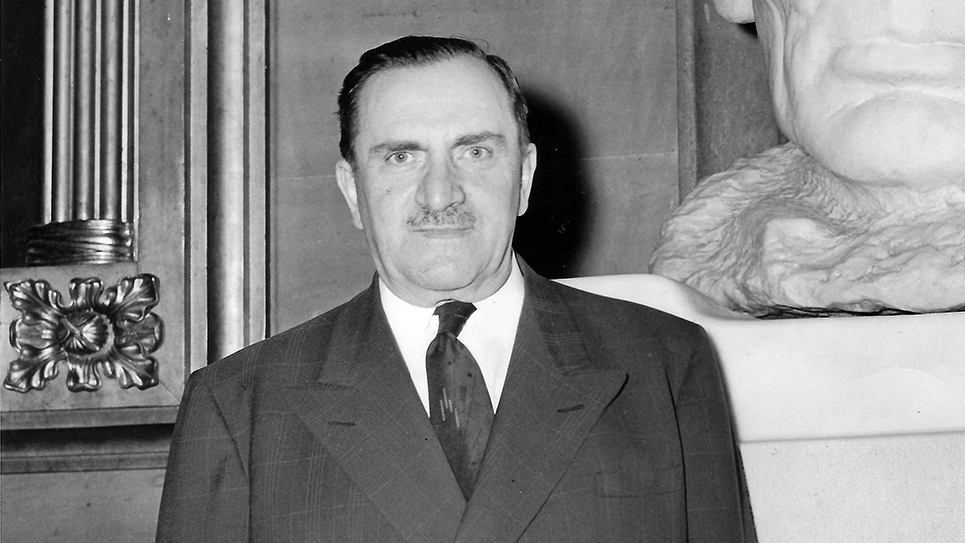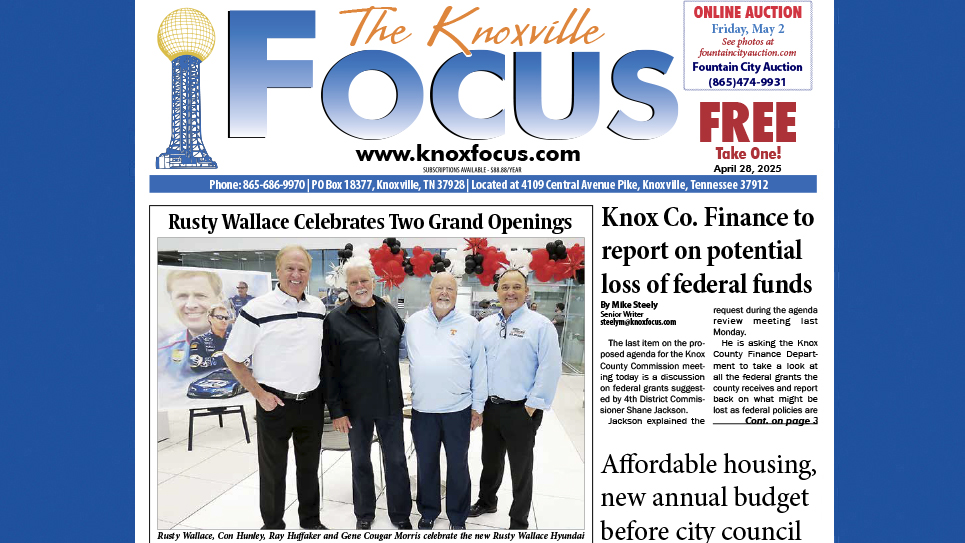The Gentleman From Washington State
Russell V. Mack
By Ray Hill
By trade, Russell Vernon Mack was a newspaperman, owning and publishing the Hoquiam Daily Washingtonian before getting elected to Congress. Educated at Stanford University and the University of Washington, Mack was born in Michigan, but moved to the Evergreen State in 1895 when he was four years old. Mack learned the newspaper business through his time at the Aberdeen Daily World, beginning as a cub reporter. Eventually, Mack became business manager for the Daily World and worked in that capacity until 1934, when he bought the Hoquiam Daily Journal.
A man of medium height with dark hair and a moustache, Russell Mack was pleasant, intelligent and friendly, all excellent attributes for any individual in virtually any field, but particularly good for one interested in politics.
Like many future congressmen, Russell Mack was a joiner, being a member of the American Legion, as he had served during the First World War, as well as the Elks, and the Northwest Rivers and Harbors Congress. Through his journalistic experience, Mack became thoroughly familiar with the issues and the attitudes of the people of Washington State. The congressman from Washington’s Third Congressional District was Fred B. Norman, a successful businessman who had held numerous local and state offices. Norman was elected to the U.S. House of Representatives in 1942 and lost his reelection bid in 1944 to Charles Savage. Norman came back two years later to wage a determined effort to win back his seat in the House from Savage. 1946 was a banner year for Republicans and Fred Norman won, but it was a pyrrhic victory, as the effort taxed the 67-year-old congressman’s strength, and he died just three and a half months into his new term. Norman’s death necessitated a special election to fill the vacancy.
Russell Mack had long been an active Republican and had twice before been the GOP nominee for the House of Representatives in Washington’s Third Congressional District. Mack had faced Congressman Martin Smith in the 1934 election and lost badly. Mack tried again six years later and made a respectable showing, but lost to Smith once again. Those losing campaigns gave Mack a base amongst fellow Republicans in the Third District, as well as a wide acquaintanceship, which proved to be a big advantage in the special election.
Russell Mack became the first Republican to file to run in the special election. Republicans had won both houses of Congress in the 1946 election, and Mack stressed the need to elect a Republican. The congressional contender told folks it was “smart politics, good business and common sense that the voters of southwest Washington should elect a Republican who can get along with and get the best results for our state from the huge Republican majority.” Mack pointed out that a freshman Democrat would have no influence in the House of Representatives. By the time of the filing deadline, there were four Republicans and three Democrats running in the special election. All of the Democrats were formidable contenders, one being former Congressman Charles Savage; the other two were state Senator Clyde Tisdale and state Attorney General Smith Troy.
At a time when the only mass media available to candidates for public office were newspapers and radio, Russell Mack used clever ads which began, “Hey Mac!,” followed by a sign with an arrow directing the reader to “Go Right” by electing Russell V. Mack to Congress.
The special election drew the attention of national newspaper columnist Marquis Childs, who thought the race would “provide a significant test on at least two of the issues troubling most Americans in this time of unrest.” Childs noted the primary contest between the three ambitious Democrats was as hot as the general election was expected to be; the columnist thought the favorite for the Democratic primary nod was state Attorney General Smith Troy. General Troy had been reelected to his post in 1944 while he was fighting in France during World War II and was a strong supporter of the Truman Administration. Childs wrote that as a congressman, Charles Savage had been closely associated with his colleague from Washington State, Hugh DeLacy, who was accused of being a Communist, or at the very least a fellow-traveler. DeLacy had recently announced that Savage was a supporter of former Vice President Henry Wallace, who appeared to be preparing a third-party run for the presidency in 1948. DeLacy had also stated that Savage was opposed to President Truman’s Greek-Turkish program. Charles Savage quickly made his own statement that somewhat altered DeLacy’s announcement, but the fact remained that he was well to the left of the Truman Administration. The Vancouver, Washington, Columbian published an editorial shortly before the special primary election, noting that while former Congressman Savage and General Troy were both Democrats, “there is no resemblance in their political philosophies.” The Colombian identified Smith Troy as a “conservative democrat who has no use for Commies or the doctrine they preach.” The newspaper then sarcastically opined, “There is about as much resemblance between Savage and a ‘regular’ democrat as between a dickie bird and a kangaroo.” The Colombian stated former congressman Charles Savage was “a radical who practices the doctrines of infiltration.” Should Savage be the Democratic nominee, the newspaper warned the general election would become “a slam-bang, knock-down-drag-out brawl” where “no punches will be spared by the adherents of the two political ideologies which will be represented.”
Russell Mack easily led the Republican primary while former Congressman Charles Savage outdistanced Smith Troy. Mack lost no time in portraying Charles Savage as a left-wing radical. “I say that if I am elected, I will go to Washington not to uphold the hand of Henry Wallace, but to uphold the hand of Uncle Sam,” Russell Mack promised.
The turnout for the special election was low, and the congressional race was close. Russell V. Mack won by less than 2,000 votes. Mack went to Washington, D.C., while Savage was encouraged by the results. The two candidates would face one another once again in the 1948 election. Charles Savage ran his third congressional campaign in as many years, but Mack was an incumbent, albeit in a year that was not a good one for GOP incumbents. Russell Mack had used his incumbency wisely, concentrating on constituent services matters, which helped him to entrench himself. In a banner year for Democrats, Mack was reelected with just over 52% of the vote. Mack had demonstrated a personal popularity that allowed him to run ahead of the regular Republican ticket for the remainder of his congressional career.
Evergreen State Democrats engaged in an exercise in frustration biannually when they attempted to dislodge Russell V. Mack from his seat in the House of Representatives. Considering the fact that Washington, D.C., and Washington State were so distant, Russell Mack was a constant presence inside the Third Congressional District. While in the Capitol, Congressman Mack was quick to answer the inquiries of his constituents and intervene on their behalf with any organization or agency.
Mack’s attention to the people of the Third District was rewarded at the ballot box and his majorities began to grow. Those congressmen who are unceasingly attentive to their people usually become political institutions inside their districts, and that was true of Russell Mack. The congressman and Mrs. Mack were driving through Texas on their way back to Washington, D.C., in December 1955 when the 64-year-old Mack became ill. Taken to a Tyler, Texas, hospital, it was discovered that Mack had suffered a mild heart attack. Doctors announced the congressman’s condition was not believed to be “serious,” and he was resting. It was also discovered that the congressman was suffering from bronchial pneumonia. One Washington State newspaper telephoned the congressman’s physician to inquire about his health, and Dr. B. M. Wilson replied, “It’s as mild as you can say a coronary occlusion can be.” Mack got on the phone and told the reporter he had begun to feel poorly while making the long trip from Washington State back to the Capitol, while driving from El Paso toward Tyler. Mrs. Mack insisted that her husband go to the hospital, which he did. As the congressman entered the hospital, one Washington State newspaper wrote Russell Mack was “still pretty weak but looking good.” Riley Zumwalt, the congressman’s secretary (chief of staff), said the heart attack had occurred due to the discovery of an “inflammation of the lining around the heart which has now entirely dissipated.” That same inflammation, according to Zumwalt, had been brought about because of the strain on the congressman’s heart by the pneumonia.
Eventually, the congressman was moved to Walter Reed Army Hospital, where he rested after the New Year. Mack made five predictions for 1956: President Eisenhower would be reelected “in a landslide”; the budget would be balanced and a tax reduction bill would be passed by Congress; the Social Security law would be amended to make women eligible for pensions at age 62 rather than 65; businesses would continue to prosper and high employment would remain that way throughout 1956; lastly, Mack predicted the United States would not become involved in any war for the New Year.
By the end of January 1956, Russell Mack had returned to his Washington office. Within days of his return to his office, newspapers in the Third District printed a photograph of the beaming congressman who had been honored by the Boy Scouts of America and given a special lapel pin on behalf of the National Council.
By the time the campaign began, Congressman Russell V. Mack was his usual energetic self. The congressman was easily reelected. Mack had a talent for breaking down complicated issues and putting issues in terms the average voter could understand and relate to. Congressman Mack also had a thorough knowledge of every industry and business inside his district and state, and the effect on each through tariffs or the lack thereof. Mack explained Japan and a few other nations had shipped 900 million square feet of plywood into the United States, which was valued at $60 million. “That much foreign plywood,” Mack explained, “is the equivalent of the production of 12 Northwest plywood mills employing 5,000 workers.”
In 1958, Washington State Democrats made a big effort to recapture as many seats in Congress as possible from Republicans. Highly popular U.S. Senator Henry Jackson was heading their ticket, and former Congressman Charles Savage was making another attempt at a political comeback against Russell Mack. A more potent vote-getter entered the Democratic primary in Victor Meyers, a band leader who had served 20 years as the Evergreen State’s lieutenant governor. In 1954, Meyers had been elected secretary of state and was running hard to dislodge Russell Mack from his seat in the House.
The election amply demonstrated that Russell Mack was too well entrenched to be beaten. In a year when Democrats won big majorities in both the House and the Senate, Congressman Mack was reelected with better than 65% of the vote.
On March 28, 1960, Congressman Russell V. Mack went about his usual business. As members gathered on the floor for the beginning of the day’s business, Mack was standing in the well of the House, making small talk with Congressman Henry A. Dixon of Utah. “It’s a nice day, isn’t it?” Dixon asked. ‘Not for me,” Mack replied. Dixon, surprised by his friend’s reply, noticed Mack wasn’t looking very well. Henry Dixon was stunned when Mack collapsed moments later. Three members of the House who were also medical doctors, Walter Judd, Thomas E. Morgan, and Dale Alford, hurried over to Mack, who was carried into a cloakroom. A call went to the office of Dr. George W. Calver, the official physician to the Congress. Dr. Calver hurried to the scene only to pronounce Congressman Russell V. Mack dead from a heart attack. Mack was 68 years old.
Russell Mack remained the only Republican to hold Washington’s Third Congressional district until 1994, when Linda Smith was elected.
© 2025 Ray Hill






